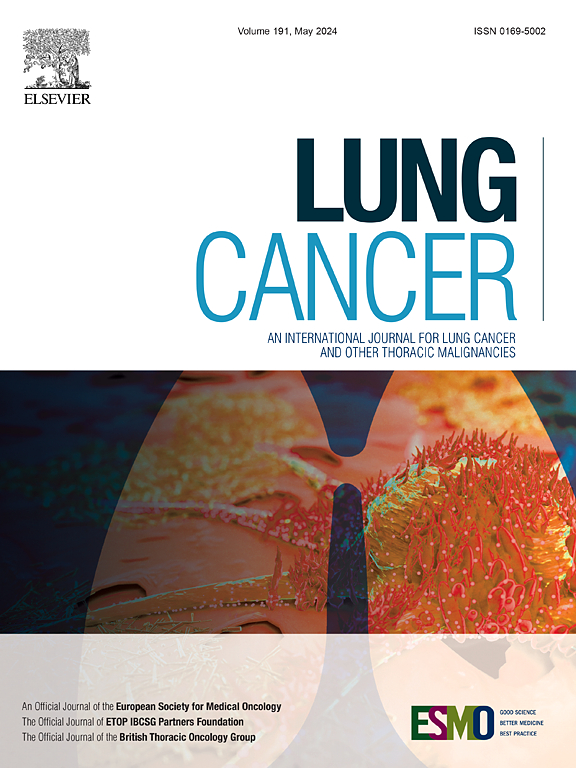Feasibility, acceptability and clinical outcomes of a real-world, regional lung cancer prehabilitation programme for patients undergoing curative intent radiotherapy
IF 4.5
2区 医学
Q1 ONCOLOGY
引用次数: 0
Abstract
Introduction
Prehabilitation improves both physiological measurements and clinical outcomes for patients undergoing surgery for lung cancer. The feasibility, acceptability and efficacy of prehabilitation for patients having curative-intent radiotherapy for lung cancer is uncertain.
Methods
Prehab4Cancer (P4C) is a regional, community-based prehabilitation service for patients with cancer in Greater Manchester in the United Kingdom. We present an evaluation of the P4C service for patients undergoing curative-intent radiotherapy for lung cancer over a 2-year period. Feasibility was evaluated against prespecified key performance indicators. Objective physiological and subjective functional assessments were recorded before and after completion. Effects on mortality in comparison to a non-prehab cohort were assessed in an exploratory regression analysis.
Results
A total of 381 patients were referred to P4C via a web-based portal. 86 % (329/381) were contacted by phone and 73 % (279/381) completed an initial assessment. 45 % (172/381) completed the prehab programme with a median of 7 (IQR 3–11) sessions during a median time to commencing treatment of 23 days (IQR 16–34). Median time from referral to assessment was 4 days (IQR 3–6) and 86 % (239/279) were completed within 7 days of referral. Six-Minute Walk Tests improved by an average of 30 m (95 % CI 20.6–41 m, p = <0.001). 16 % (n = 21/132) of participants initially score “Medium” or “High” on IPAQ for weekly physical activity, improving to 52 % (n = 66/132) on programme completion. Participants had a median reduction in score of −2.5 (95 % CI −3.0 to −1.5) in WHODAS 2.0. There was an 8 % reduction in 1-year mortality in patients completing prehab (11 %, 17/160) vs those that did not complete prehab (19 %, 30/158, OR 0.5, 95 % CI 0.24–1.00, p = 0.054) after adjustment for age, gender, performance status and cancer staging.
Conclusions
The P4C programme has demonstrated feasibility, acceptability and effectiveness in patients with lung cancer undergoing curative-intent radiotherapy.
现实世界的可行性,可接受性和临床结果,区域肺癌预防方案的患者接受治疗意图放疗
前言:预康复可以改善肺癌手术患者的生理指标和临床结果。肺癌放射治疗患者康复的可行性、可接受性和疗效尚不确定。方法sprehab4cancer (P4C)是英国大曼彻斯特地区为癌症患者提供的区域性社区康复服务。我们提出了一项评估P4C服务的患者接受治疗意图放疗的肺癌超过2年期间。可行性根据预先指定的关键绩效指标进行评估。完成前后分别记录客观生理和主观功能评估。在探索性回归分析中评估了与非prehab队列相比对死亡率的影响。结果共有381例患者通过网络门户转介到P4C。86%(329/381)通过电话联系,73%(279/381)完成了初步评估。45%(172/381)的患者在开始治疗的中位时间为23天(IQR 16-34)内完成了中位数为7次(IQR 3-11)的预训练计划。从转诊到评估的中位时间为4天(IQR 3-6), 86%(239/279)在转诊7天内完成。6分钟步行试验平均改善30米(95% CI 20.6-41米,p = <0.001)。16% (n = 21/132)的参与者最初在每周身体活动的IPAQ得分为“中等”或“高”,在项目完成后提高到52% (n = 66/132)。在WHODAS 2.0中,参与者的评分中位数降低了- 2.5 (95% CI为- 3.0至- 1.5)。在调整年龄、性别、运动状态和癌症分期后,完成预治疗的患者1年死亡率比未完成预治疗的患者降低8% (11%,17/160)(19%,30/158,OR 0.5, 95% CI 0.24-1.00, p = 0.054)。结论P4C方案在肺癌患者接受治愈性放射治疗中具有可行性、可接受性和有效性。
本文章由计算机程序翻译,如有差异,请以英文原文为准。
求助全文
约1分钟内获得全文
求助全文
来源期刊

Lung Cancer
医学-呼吸系统
CiteScore
9.40
自引率
3.80%
发文量
407
审稿时长
25 days
期刊介绍:
Lung Cancer is an international publication covering the clinical, translational and basic science of malignancies of the lung and chest region.Original research articles, early reports, review articles, editorials and correspondence covering the prevention, epidemiology and etiology, basic biology, pathology, clinical assessment, surgery, chemotherapy, radiotherapy, combined treatment modalities, other treatment modalities and outcomes of lung cancer are welcome.
 求助内容:
求助内容: 应助结果提醒方式:
应助结果提醒方式:


